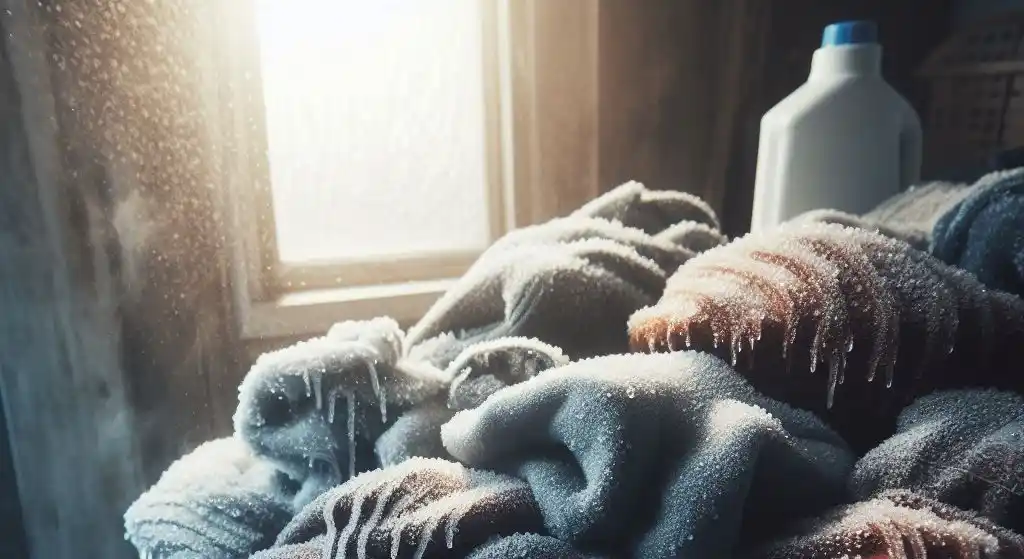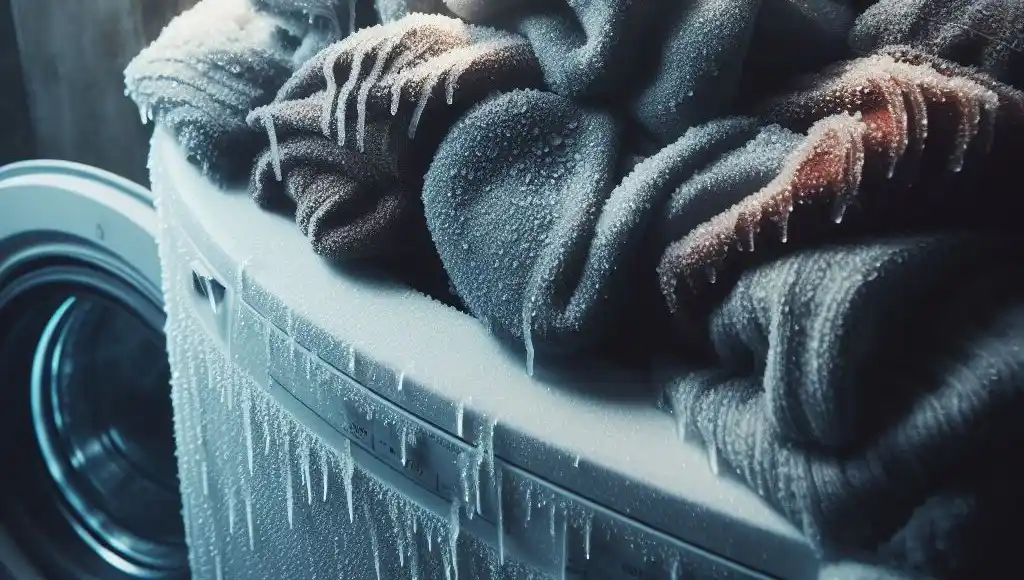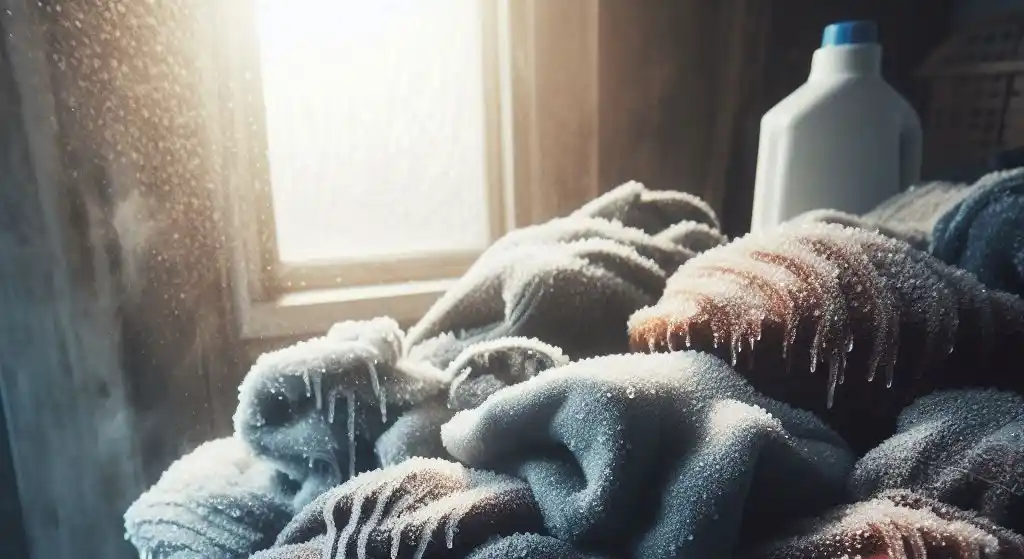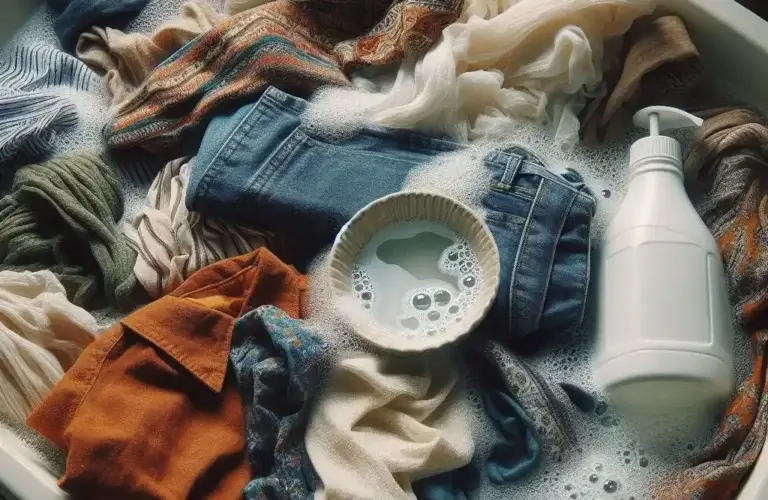Can You Wash Clothes When It’s Freezing Outside? Explore Extreme Cold Weather Affects Your Appliances
Cold weather and freezing temperatures can throw a wrench in your regular laundry routine. If the temperature drops below freezing, you may be wondering if it’s safe or practical to still wash clothes when it’s so cold outside.
This is a great question, and the answer depends on a few key factors. In this comprehensive guide, we’ll cover everything you need to know about how can you wash clothes when it’s freezing outside, including:
- How cold weather affects washing machines and dryers
- The risks of washing clothes when it’s freezing
- Tips for safely running appliances and drying laundry on frigid days
- When it’s better to opt for a laundry service until spring
Table of Contents
How Cold Temperatures Affect Washing Machines
Your washing machine may be vulnerable to extreme cold weather in a few key ways:
- Frozen water pipes – if temps dip below freezing, the water lines connected to your washer can freeze. This stops water flow, preventing the machine from filling.
- Damage to water valve – frozen water expanding inside hoses can actually cause the water intake valve to break. Repairs may be needed before the machine will run again.
- Water freezes during cycles – if your washing machine fills with water and then sits idle for too long in freezing temps, the remaining water inside can turn to ice. This can damage internal parts.
Many modern washers have some freeze protection features, but they are not foolproof. Using a washing machine when it’s extremely cold does carry some risk of damage.
Dangers of Washing Clothes Below Freezing
Aside from potential washing machine damage, there are a few other downsides to trying to wash clothes during freezing winter weather:
- Clothes may freeze solid if left outside or taken out of a dryer before fully dried
- Ice or broken pipes resulting from frozen laundry water can lead to major water damage in your home
- Rubber door seals and hoses may become cracked and damaged by the cold
- Harsh laundry detergents may not dissolve properly in extremely cold water temps
While you can take some extra precautions, there is always an element of risk in doing laundry when temperatures dip well below freezing. If your laundry room or appliances are not well insulated, you may want to avoid running major cycles.
Laundry Machine Precautions in Cold Weather
If you need to wash clothes and temperatures are below freezing for a few days, there are a few steps you can take to protect your appliances:
- Keep laundry room doors shut and use a space heater if possible to maintain warmer indoor temperatures
- Only run full loads of laundry to limit total run time on cold days
- Consider using shorter, gentle cycles to reduce water needs
- Immediately remove clothes from the washer after cycles complete
- Use pipe insulation to protect exterior hoses and ensure adequate indoor airflow to vent moisture
These small changes can help safeguard your washing machine from freezing temperatures. But if the bitter cold stretches longer than a few days, you may need to avoid doing laundry altogether until the weather warms up again.
Can You Wash Clothes When It’s Freezing Outside? Solution is Here

Yes, you can wash clothes when it’s freezing outside, but there are a few things to keep in mind to ensure a smooth laundry day and avoid any appliance woes. Here’s a breakdown:
Washing Concerns:
- Frozen Pipes: The biggest concern in freezing temperatures is the risk of frozen pipes. If your washing machine’s hoses or the water supply lines leading to it run through uninsulated areas exposed to the cold, they can freeze and crack, causing leaks and potential damage. This is more likely in basements, garages, or laundry rooms located on exterior walls.
- Detergent Effectiveness: Most laundry detergents work best in water temperatures of 60°F (15°C) or higher. If the incoming water is too cold, the detergent may not activate properly, leading to less effective cleaning. This is especially true for heavily soiled clothes or those requiring stain removal.
Tips for Safe and Effective Cold-Weather Laundry:
- Insulate exposed pipes: Wrap the washing machine hoses and any exposed water lines with pipe insulation to prevent freezing. You can find foam or rubber insulation sleeves at most hardware stores.
- Warm Up the Water: If you’re concerned about the incoming water being too cold, run the hot water faucet for a few minutes before starting the washing machine. This will help warm up the pipes and ensure a more effective wash.
- Adjust the Water Temperature: Consider using the warm or hot water setting on your washing machine instead of cold, especially for heavily soiled laundry. This will provide the necessary water temperature for optimal detergent activation and cleaning.
- Drain and Disconnect Hoses (Optional): If you’re going away for an extended period during freezing weather, consider draining and disconnecting the washing machine hoses as an extra precaution against freezing and potential leaks. Consult your washing machine manual for specific instructions.
Drying Concerns:
- Vent Icing: If your dryer vents outdoors, the moisture expelled during the drying cycle can freeze and build up inside the vent pipe, potentially blocking airflow and creating a fire hazard. Ensure proper ventilation and clear any ice buildup regularly.
- Slow Drying Times: In freezing temperatures, outdoor clotheslines will take longer to dry your laundry. If you’re using a tumble dryer, be prepared for slightly longer drying times due to the colder ambient air.
Bonus Tip: Line drying your clothes indoors can be a great option during the winter. The moisture released from the laundry can help humidify the dry air, while the clothes themselves will dry relatively quickly thanks to the indoor warmth. Just ensure proper ventilation to prevent moisture buildup and condensation.
By following these tips, you can safely and effectively wash your clothes even when the temperatures drop. Remember, a little preparation goes a long way in ensuring a smooth laundry day and protecting your appliances from winter’s wrath.
Tips for Drying Laundry Below Freezing

Washing clothes in winter is just half the battle – you still need to be able to thoroughly dry them as well. Here are some tips for effective clothes drying when it’s cold out:
Use a Vented Dryer
A clothes dryer exhausts warm, moist air outdoors instead of inside your home. This prevents moisture from condensing on cold walls or windows, which reduces the chances of ice, and mold growth issues down the road.
Just be sure to thoroughly clean the lint filter regularly for fire safety and efficiency.
Opt for Medium or Low Heat
When using a dryer in winter, opt for medium or low heat settings. The outside vent flap can freeze shut if extremely hot, moist exhaust air leaves the dryer. Lower heat leaves just enough warmth to dry without freezing the flap.
Know Dry Times May Increase
On very cold or windy winter days, clothes may take longer to dry completely, even in a dryer. Budget extra time for a couple of full cycles if items are still damp, and check that your exterior vent is clear of snow or ice blockages.
Have an Indoor Drying Backup Plan
Even dryers can struggle to fully dry large loads on bitterly cold days. Have an indoor clothes drying rack ready to hang anything that is still damp after a couple of dryer cycles. Place it in a room with adequate air circulation.
When to Avoid Laundry Altogether
In extremely frigid temperatures, or if your washing machine is located in an uninsulated garage or basement, you may just need to avoid doing laundry altogether when it’s below freezing outside.
Here are a few good signs it’s better to wait until warmer weather returns:
- Forecast shows highs below freezing for 5+ days straight
- Your home or pipes have frozen in past cold snaps
- Laundry appliances are located in an uninsulated, detached room
- You’ll need to hang clothes outside to dry fully
In these cases, the best bet is to utilize a laundry service for a couple of weeks until daily high temps creep above freezing again. This minimizes the risks of damage, saves you the hassle, and avoids unnecessary water usage.
Key Takeaways on Freezing Temp Laundry
- Extreme cold can damage washing machines via frozen water lines or internal ice formation
- Only run full loads and opt for shorter, gentler cycles below freezing
- Dryers work well in winter but require vent maintenance and extra time
- Avoid doing laundry altogether if highs stay below freezing for multiple days
- Utilize professional laundry services if home appliances are at high risk of freezing
With the right precautions, you can safely run laundry even during cold winter weather. But if conditions are too extreme, letting the professionals handle things for a bit makes the most sense to avoid damage or hassles.
Stay warm this winter, and don’t let Old Man Winter keep you from clean clothes! Just use caution and common sense when it comes to choosing days frigid enough to steer clear of laundry duties for a while. Your pipes, appliances, and wardrobe will thank you after the spring thaw!
I hope this guide gives you the key details on washing laundry when temperatures take an icy turn. Let me know if you have any other winter-related appliance questions!
FAQs About Washing Clothes in Freezing Weather
Q: Can I use my washing machine when it’s below freezing outside?
A: Yes, you can, but it’s crucial to take precautions to prevent frozen pipes and ensure optimal detergent performance.
Q: What’s the biggest risk when washing clothes in freezing temperatures?
A: The most significant risk is frozen pipes. If water supply lines or hoses freeze, they can crack or burst, causing leaks and potential damage.
Q: How can I prevent my washing machine pipes from freezing?
A:
- Insulate exposed pipes with foam or rubber insulation sleeves.
- Run the hot water for a few minutes before starting the wash to warm up the pipes.
- Consider using the warm or hot water setting on your washer instead of cold.
- If leaving for an extended period in freezing weather, drain and disconnect hoses.
Q: Will my laundry detergent work properly in cold water?
A: Most detergents work best in water temperatures of 60°F (15°C) or higher. Using the warm or hot water setting can ensure more effective cleaning.
Q: Are there any drying concerns in freezing weather?
A:
- Vent Icing: Moisture from dryer vents can freeze, blocking airflow and creating a fire hazard. Regularly clear ice buildup.
- Slow Drying Times: Expect longer drying times outdoors or with a tumble dryer.
Q: What’s a good alternative to outdoor drying in freezing temperatures?
A: Line drying indoors can humidify dry air and dry clothes relatively quickly. Ensure proper ventilation to prevent moisture buildup.
Conclusion
In conclusion, while washing clothes in freezing temperatures requires a little extra planning and precaution, it’s doable with the right approach. By prioritizing pipe insulation, adjusting water temperature, and minding vent icing, you can keep your laundry running smoothly through winter’s chill. Embrace indoor drying as a bonus benefit, humidifying your home while drying your clothes. Remember, a little winter wisdom goes a long way in keeping your laundry routine on track and your appliances in top shape. So, stay warm, wash safely, and enjoy the satisfaction of clean clothes, even when the mercury dips.








